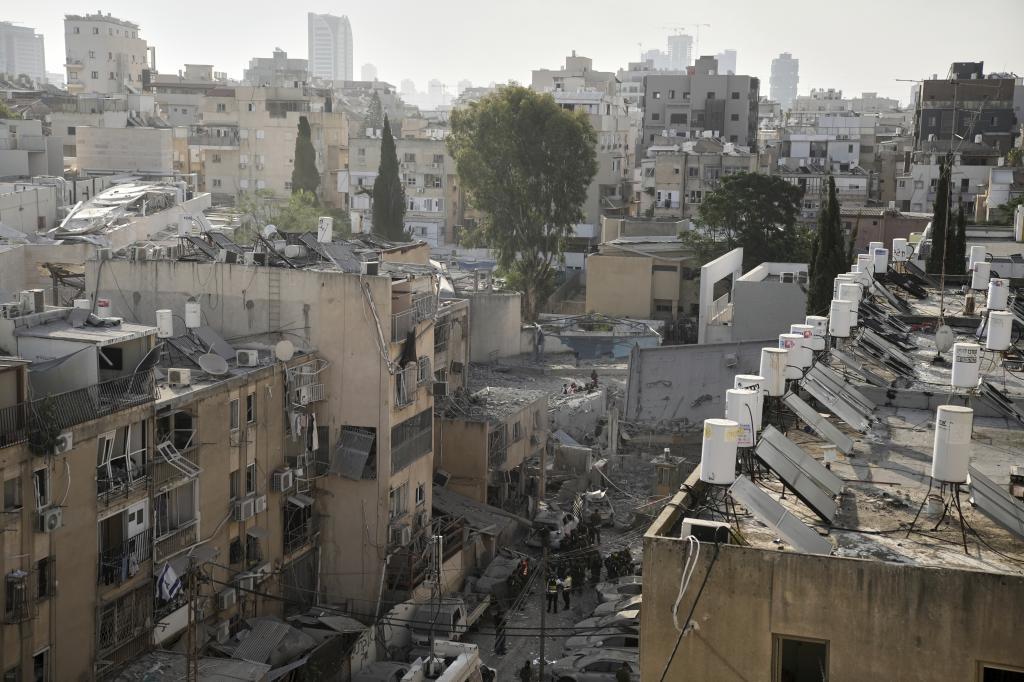The American Consulate in Tel Aviv suffered minor damage from the concussion of an Iranian missile landing nearby, U.S. Ambassador Mike Huckabee said on Monday.
Huckabee said in a post on X there were no injuries to American personnel but that the consulate in Tel Aviv and Embassy in Jerusalem would remain closed through the day as a precaution.
The damage came amid a new wave of Iranian missile attacks on Israel in retaliation for Israel's sweeping attacks on Iran's military and nuclear infrastructure.
Iran fired a new wave of missile attacks on Israel early Monday, triggering air raid sirens across the country as emergency services reported at least five killed and dozens more wounded in the fourth day of open warfare between the regional foes that showed no sign of slowing.
Iran announced it had launched some 100 missiles and vowed further retaliation for Israel's sweeping attacks on its military and nuclear infrastructure, which have killed at least 224 people in the country since last Friday.
The attacks raised Israel's total death toll to at least 18, and in response the Israeli military said fighter jets had struck 10 command centers in Tehran belonging to Iran's Quds Force, an elite arm of its Revolutionary Guard that conducts military and intelligence operations outside Iran.
Powerful explosions, likely from Israel's defense systems intercepting Iranian missiles, rocked Tel Aviv shortly before dawn on Monday, sending plumes of black smoke into the sky over the coastal city.
Authorities in the central Israeli city of Petah Tikva said that Iranian missiles had hit a residential building there, charring concrete walls, shattering windows and ripping the walls off multiple apartments.
The Israeli Magen David Adom emergency service reported that two women and two men — all in their 70s — and one other person were killed in the wave of missile attacks that struck four sites in central Israel.
"We clearly see that our civilians are being targeted," said Israeli police spokesman Dean Elsdunne outside the bombed-out building in Petah Tikva. "And this is just one scene. We have other sites like this near the coast, in the south."
Petah Tikva resident Yoram Suki rushed with his family to a shelter after hearing an air raid alert, and emerged after it was over to find his apartment destroyed.
"Thank God we were OK," the 60-year-old said.
Despite losing his home, he urged Israeli Prime Minister Benjamin Netanyahu to keep up the attacks on Iran.
"It's totally worth it," he said. "This is for the sake of our children and grandchildren."
In addition to those killed, the MDA said paramedics had evacuated another 87 wounded people to hospitals, including a 30-year-old woman in serious condition, while rescuers were still searching for residents trapped beneath the rubble of their homes.
"When we arrived at the scene of the rocket strike, we saw massive destruction," said Dr. Gal Rosen, a paramedic with MDA who said he had rescued a 4-day-old baby as fires blazed from the building.
During an earlier barrage of Iranian missiles on central Israel on Sunday, Iranian Foreign Minister Abbas Araghchi said that Iran will stop its strikes if Israel does the same.
But after a day of intensive Israeli aerial attacks that extended targets beyond military installations to hit oil refineries and government buildings, the Revolutionary Guard struck a hard line on Monday, vowing that further rounds of strikes would be "more forceful, severe, precise and destructive than previous ones."
Health authorities also reported that 1,277 were wounded in Iran, without distinguishing between military officials and civilians.
Rights groups, like the Washington-based Iranian advocacy group called Human Rights Activists, have suggested that the Iranian government's death toll is a significant undercount. Human Rights Activists says it has documented more than 400 people killed, among them 197 civilians.
Israel argues that its assault on Iran's top military leaders, uranium enrichment sites and nuclear scientists was necessary to stop Iran from obtaining a nuclear weapon.
Iran has always insisted its nuclear program is peaceful, and the U.S. and others have assessed that Tehran has not pursued a nuclear weapon since 2003.
But Iran has enriched ever-larger stockpiles of uranium to near weapons-grade levels in recent years and was believed to have the capacity to develop multiple weapons within months if it chose to do so.
